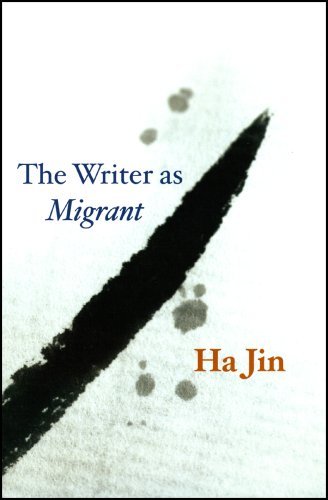 These are three essays on the notion of migration for the writer, mostly explained through other writers such as Nabokov, Conrad, Kundera and Naipaul.
These are three essays on the notion of migration for the writer, mostly explained through other writers such as Nabokov, Conrad, Kundera and Naipaul.
In the first essay, The Spokesman & the Tribe, Jin explores the balance between the individual and the collective, and asks to what extent a writer can ‘speak for’ his nation or people, especially if he has abandoned them to live in a new country. I was interested in his initial desire as a young writer to write “on behalf of the downtrodden Chinese”. He makes it clear that he later abandoned this position, but I would have liked to know more about how and why.
In fact, throughout the whole book I would have liked to know more about Ha Jin’s thoughts on migration. His journey, after all, was an interesting one – from an uneducated teenage soldier in the Chinese army during the Cultural Revolution to a professor at Boston University and author of five novels, a couple of which I’ve read and greatly enjoyed. I would have liked him to draw on his own experience of migration, but he does so only rarely, in small glimpses like the one mentioned above. Mostly what we have is a survey of other writers and their thoughts on migration – quite interesting, but for me ultimately unsatisfying because there was no clear overall argument or point of view to draw the whole thing together.
In any case, it was interesting to learn about Solzhenitsyn’s life in America, how he lived in rural Vermont but never really settled, never took citizenship, was always waiting to go back to Russia. After the fall of the Soviet Union he got his chance, but the interesting thing was that after moving back home, he struggled to speak effectively on behalf of the new Russia, as he had spoken on behalf of the old while in exile. His later books Russia in Collapse (1998) and Two Hundred Years Together (2001) were coldly received, and he was seen as out of touch. Even his radio show was cancelled due to low ratings. Ha Jin’s point is that he was loved for his earlier masterpieces, but even that did not give him the right to speak on behalf of the people – when his views no longer matched theirs, they rejected him.
The second essay, The Language of Betrayal, deals with the decision to write in another language. Again, Jin does not speak of his own decision to write in English and whether he feels this is a betrayal — instead we hear about Joseph Conrad being criticised for abandoning the Polish language, and Nabokov’s difficulty writing poetry in English even though he was a master of prose.
An Individual’s Homeland explores the difficulty of returning home — the way that Odysseus initially didn’t recognise Ithaka when he returned after his twenty years of exile, because both he and the land itself had changed. As Jin says, “One cannot return to the same land as the same person.” He talks of using art to survive, as the character Max Ferber does in W.G. Sebald’s book The Emigrants. He ends by referring to the Greek poet CP Cavafy, who positions ‘Ithaka’ as a destination for life’s journey, but not necessarily a return to the homeland. The homeland becomes a part of the past that can be used “to facilitate our journeys”.
As you’d expect from an English professor, the analysis of writers and books here is astute and interesting. I just got the feeling sometimes that he was talking about other writers to avoid talking about himself. Using literary examples is a good idea, but I’d have preferred them to be used to support a clearer argument from Ha Jin himself, drawing on his own experiences to give us his unique, original perspective instead of a summary of other people’s.



There are 2 comments
Hi Andrew,
I found your website from googling “Ha Jin Writer as Migrant.” This collection of essays is one of my favorites. I was trying to find a quote, and stumbled on to your site.
You say: “I was interested in his initial desire as a young writer to write “on behalf of the downtrodden Chinese”. He makes it clear that he later abandoned this position, but I would have liked to know more about how and why.”
If memory serves, I think he was pretty clear why he abandoned writing on behalf of the Chinese—you cannot represent other people. Exceptions abound, someone will always protest or point out that, “hey, that’s not me/us!” Solzhenitsyn in effect tried to do this—he tried to represent all of Russia, and though he was quite prolific in doing so, the Russian people failed to connect with his books. Russians did not feel like Solzhenitsyn represented them. To Ha Jin, Solzhenitsyn wasted his efforts and talents. You can only truly be able to represent yourself.
I think he illustrates this again (is this also in this essay?) with the top Chinese scholar guy with so much potential, with so much exceptional exposure to the world, but instead of writing something truly of his own voice—he works on the first Chinese-English dictionary. While such a dictionary is no doubt needed and necessary, it doesn’t take someone with his kind of brains and talent to do so. In fact, a collective can do it—and you can’t compete with a collective. And that’s exactly what happened, his dictionary was quickly made extinct, replaced by the work of a collective. To Ha Jin, this guy had wasted so many years doing what so many others could do, really for nothing. He had wasted his talents; he had failed to do the thing only he could do.
Like you, I remembering feeling a bit annoyed he didn’t just come out and say his point of view, that he used all these other writers to illustrate his point. But this is how he came to this wisdom—through pondering these other writers. I liked that he didn’t out right say what it meant for a writer to be a migrant. I think to some extent it meant he was every changing, every evolving, and that he is doing that still. And being a migrant, frees one to try for even more transcendent art.
Anyway—it’s been a while since I’ve read it. My memory could be off. I really need to figure out where I put my copy…
Thanks for posting in 2009.
Hi Grace
Thanks for your comment! I always like it when someone stumbles across one of my old posts. It’s particularly good when they bring new ideas and a fresh perspective to a book I didn’t altogether enjoy. You’ve made me want to read it again! Unfortunately I’ve moved abroad twice since 2009, and have jettisoned books along the way, this being one of them. And my memory’s so bad that I can’t engage meaningfully with the points you raise. But I appreciate you leaving your thoughts here, and thank you for helping me see some things in the book that I may have missed!